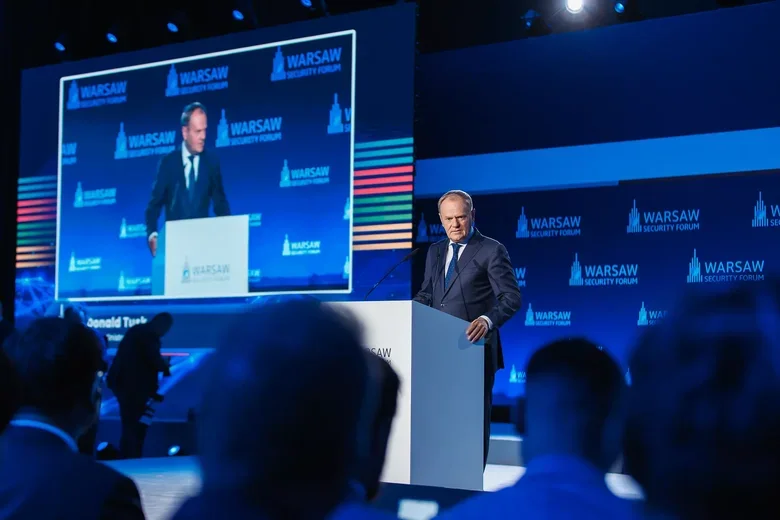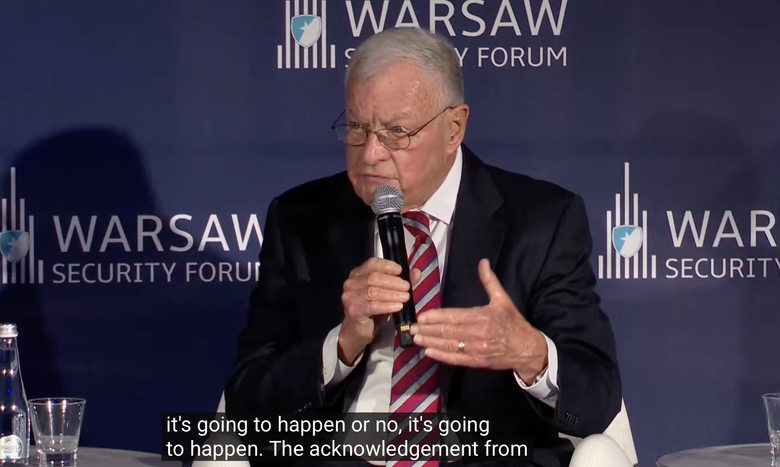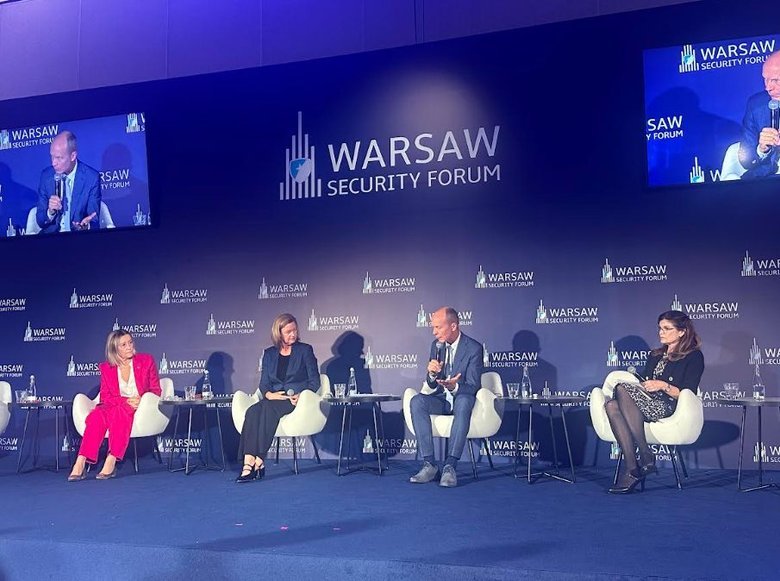Whether Russian bear roused Europe: unwarranted optimism and cold shower at security forum in Warsaw
On September 10, more than 20 Russian drones attacked Polish airspace. To repel the attack, the air forces of four NATO countries were scrambled, with F-35s engaged in taking down the drones, and the resources employed were disproportionate to the threat. As a result of the attack, one house was destroyed and four Polish airports suspended operations for at least four hours.
Three weeks later, similar attacks were repeated against a number of European airports. However, Europeans reacted very cautiously to these "incursions," careful not to trigger Article 5 of the North Atlantic Treaty.
On September 29–30, the traditional security forum was held in Warsaw. In many ways, it became a precedent-setting event to determine whether Europe in general, and Poland in particular, are prepared for war.
Russia is losing, but we will not spend its money
"This is our war… It is not about whether someone loves Ukraine, or what historical experience they had with it – good or bad… This is a matter of the security and survival of the entire Western civilization… If we lose this war, the consequences will affect not only our generation, but also the future in Poland, across Europe, in the United States, everywhere in the world. Let us have no illusions about that," Polish Prime Minister Donald Tusk said at the forum’s opening.
"Let us not ask how to preserve complete unity, how to convince, for instance, our American friends to engage more and for longer in the Ukrainian issue. Above all, let us show that we are capable of mobilizing our societies," he added.
Despite the fact that Poles never received a clear, hard-edged comment from Donald Trump on the events in Poland, the Polish prime minister chose not to abandon the national tradition of embracing the Americans as tightly as possible. While also holding on to the European community.
In his speech, Tusk stressed that the United States has the right to demand greater European involvement in matters of Europe’s own security. At the same time, he added that Europe can expect Washington to treat NATO as "the guarantor of our world’s survival."
"Let them learn from one another. Let no one lecture anyone else, but let each learn the other’s responsibilities," Tusk said, trying to reconcile everyone.
However, the day’s champion of optimism was not him but France’s foreign minister, Jean-Noël Barrot, who opened by saying that "Russia is being defeated militarily, economically, and politically."
It should be emphasised that he said this as part of the panel "Raising the stakes: should Europe be afraid?"
"It has been three years, and Russia has made no progress at the front, while its civilian economy is now collapsing because of the resources Putin is channeling into the war effort. This is due to the effectiveness of the Ukrainian Armed Forces, which are taking out Russia’s logistics hubs and energy assets, and to the sanctions we have imposed and are preparing to impose again in coordination with the Trump administration," Barrot said.
"Russia’s recent provocations in the sky pursued two aims: first, to conceal Russia’s defeats at the front; second, to try to discourage European countries from further supporting Ukraine. In my view, this proved highly counterproductive, as it prompted additional support for Ukraine," the French minister assured.
For that matter, had President Trump’s special envoy to Ukraine, Keith Kellogg, been seated on that same panel, he would have been a natural fit on that panel, with its near-universal optimism.
"Russia will not win this war. Russia has not crossed the Dnipro, has not taken Kyiv, Kharkiv, or Odesa. The Russians have managed to seize only part of the Luhansk, Donetsk, and Zaporizhzhia regions," Kellogg said during his speech on Tuesday.
He separately stressed the cost of this war, noting that it has already claimed a million lives on both sides, and that it must be brought to an end.
What Kellogg did not clearly say, however, was whether Ukraine could count on Tomahawks and what further red line Russia would have to cross for the United States to respond.
The last question came from a Polish general, and the answer was highly diplomatic.
Kellogg had two appearances in Warsaw—one individual, the other within a panel. At the end of the latter, the moderator, European Politico editor Jan Cienski, asked the general: where exactly the United States is in this war—they are balancing, or they are firmly inside the common camp with the Europeans?
And it must be said that Trump’s envoy once again proved too good a diplomat for a general, noting that there have already been so many killed in this war that it is necessary to look for some balance for negotiations—while at the same time reminding that the United States has not given Russia a single weapon in this war, but has provided Ukraine with more arms than anyone else.
What Poles are good at is building strong relations with powerful countries. And as a counterpoint to the United States, Poland’s Foreign Minister Radosław Sikorski did not fail to recall his recent meeting in Warsaw with his Chinese counterpart Wang Yi, emphasizing that only China can force Russia to stop fighting.
Sikorski stressed that China is interested in trade with the EU, and the trade route into Europe through Poland must be secure. He therefore used his meeting with his Chinese counterpart to guide Lukashenko onto the right path and to urge him not to further destabilize the shared Polish-Belarusian border.
"I personally believe that China is the only country that can actually force a ceasefire in this war," he stressed.
He recalled how, in January 2022, Russia deployed its troops to Kazakhstan during the unrest, but withdrew them very quickly under pressure from China.
Of course, those two days were full of declarations of support, but let us remember what the Ukrainian president and foreign minister asked for at the forum in Poland.
"Ukraine proposes that Poland and all our partners create a joint, truly reliable shield against Russian aerial threats. This is possible. Ukraine can counter all types of Russian drones and missiles, and if we act together in the region, we will have sufficient weapons and production capacity to do so," Volodymyr Zelenskyy said during his address to the forum.
"We are counting on decisive steps to make full use of Russian assets so that Ukraine can already purchase additional armaments in America and Europe," said Ukrainian Foreign Minister Andrii Sybiha.
Unfortunately, it is already known that after the meeting in Copenhagen the day following the Warsaw forum there was no progress on using Russian assets. EU leaders failed to agree on a proposal to grant Ukraine a €140 billion loan backed by frozen Russian assets. Belgium, France and Luxembourg opposed the plan.
Now, let us talk about weapons, their production, and the single shield.
In addition to the main hall with political panels, the Warsaw forum hosted several other formats featuring specialized discussions.
A number of those sessions dealt specifically with the development of European armaments. And they were well worth listening to.
About Europe, the grown-up girl and Daddy Trump
"I truly see Europe as a giant. It is a soft and lazy giant that has been sleeping for the past 70 or 80 years, and it was not awakened by the kiss of a charming prince but by the bite of a polar bear. The only question is, have we woken up? I think so," said French Senator Hélène Conway-Mouret.
But according to her, most EU countries now face the question of whether they can manage without American support and with the realization that the answer is no.
"The problem we face today is that we are in a race and it is a race against time, where we need to do certain things very quickly, whereas normally cultural change takes time. And Europe is very slow right now, because many of our partners still cannot grasp that times have changed, that the United States is tired of playing Daddy, and that Europe is already a grown-up girl who will now have to take care of herself," Mouret said.
As is known, in May this year the European Commission allocated €150 billion under the SAFE (Security Action for Europe) program, distributing the funds among 19 EU countries. Poland, Romania, France and Hungary will receive the largest shares. The program provides long-term, low-interest loans for the purchase of armaments.
According to Herald Ruijters, the head of the program, it is now moving "at the speed of light," not only in terms of approval but also in the allocation of funds. The distribution plans for each of the 19 states will be ready by the end of November.
"Then we will have the approval process, and we hope that around €22 billion will start flowing at the beginning of 2026," said the head of the SAFE program (introduced by the moderator as the most popular man in Europe).
Nine capability areas are prioritized, including, among others, land combat, naval, and integrated missile defense. At the same time, SAFE wants to see member states’ programs, what they will include and how well they will integrate with one another.
While NATO Support and Procurement Agency (NSPA) representative Stacy Cumming spoke about the challenge of aligning national interests with NATO’s common requirements, Beth McGrath from Deloitte argued that greater competition would bring not only higher efficiency but also better results, and that manufacturing companies will want guarantees in the form of long-term contracts.
Mouret also noted that Europeans currently export 80% of what they produce, mostly outside Europe. For many years, European manufacturers have been oriented exclusively toward external markets, where they competed with one another. What concerns the senator now is that these companies have virtually no experience in cooperation or working toward a single goal and that is precisely the challenge Europe now faces.
Another problem, she said, is the tendency to buy products from other countries instead of developing Europe’s own production lines.
However, Stacy Cumming responded that the task now is to procure everything needed as quickly as possible. But in order to buy it in Europe, she said, there is only one way—joint production.
Despite all the speakers talking about how they want to move faster and do things better, they were confronted from the audience with several cold questions: why is Europe taking so long to get moving, why does it spend years producing something extremely expensive while Ukrainians are already replacing it on the battlefield with something cheap, and what else would have to happen for Europe to finally start moving faster.
Interestingly, there was no Ukrainian representative on this panel, although one would have been highly appropriate to speak about firsthand experience.
However, during the next panel, Ukrainian company TAF Industries was represented by Oleksandr Yakovenko, whose firm produces 80,000 drones per month and has spent $1 billion this year alone on components. The entrepreneur did not hide the fact that all of these components come from China.
He added that building new production lines in Ukraine, and especially in Europe, would be costly. Moreover, he asked the general present on the panel how long codification takes in Europe, since in Ukraine it is already measured in weeks. Another remark he made was that if one requests a testing range in Europe, it can take several months, whereas in Ukraine tests can be carried out in just a couple of weeks. And right now, time determines everything.
Therefore, it is most fitting to conclude this text by quoting former Lithuanian President Dalia Grybauskaitė.
"During my 10 years in office, I witnessed an arrogant confidence in NATO’s superiority. At the time, we thought we were the best. We had the best equipment, the best military capabilities, and then we were confronted with drones made practically of paper, and we tried to shoot them down with $100 million fighter jets. This is a mismatch between how we assess ourselves and how we perceive and evaluate the real situation, when after three and a half years of war in Ukraine we are still unable to understand what war actually looks like," Grybauskaitė said after yet another round of triumphant assurances from the French representative.
"The reaction to drone attacks in our countries shows that we are not at all ready to respond adequately. This means not only that we are late, but that conceptually we have not even reached the point where we can learn from the Ukrainians. For three years now, Ukrainians have been inviting us—come and learn," the former Lithuanian leader emphasized.
But, evidently, the bear will have to bite once again.
Tetiana Nikolaienko, Censor. NET




